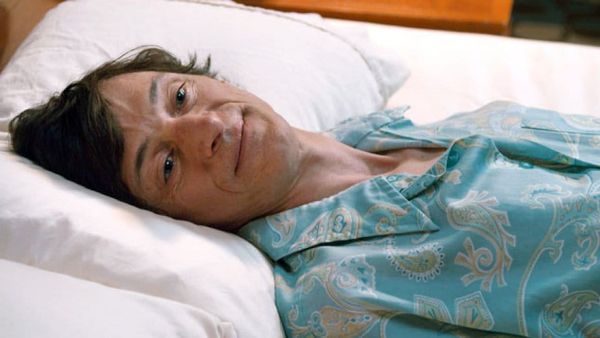Eye For Film >> Movies >> The Sessions (2012) Film Review
The Sessions
Reviewed by: Sophie Monks Kaufman

If you think having a healthy sex life is hard, try conducting one from inside a polio-ravaged body needing nightly regeneration in an iron lung for survival. Yet John Hawkes’ twinkly-eyed embodiment of the poet/journalist Mark O’Brien conjures inspiration not pity. In world saturated with photogenic, sterilised depictions of sexual encounters, the tenderness and awkwardness of Mark’s voyage into sensuality could teach a lot of people not to worry about bullshit.
Mark, who lived in Berkeley, California until his death in 1999, left behind a wealth of written material which director Ben Lewin has drawn on to resurrect a man, distinguished by his gentle appreciation for life’s riches. Those expecting to revisit the tormented incapacity found in The Diving Bell And The Butterfly will be surprised to find a witty and joyful philosopher guide. “I was no longer allowed to use my other gurney, the self-propelled one, after a series of spectacular accidents,’” says Hawkes mischeviously in the first scene. It feels good to laugh with him.

Mark’s confessional essay On Seeing A Sex Surrogate is fodder for the film’s fundamental drama, with Helen Hunt playing Cheryl, the tough Brooklyn mother and caring surrogate to whom Mark’s cherry is entrusted. The distinction between a sex surrogate (someone employed for a finite number of sessions to help the disabled with physical intimacy) and a prostitute (who wants ongoing trade) is fully laid out for both Mark’s and our benefit.
William H Macy is the third wheel, Father Brendan, an undeveloped character present to enable Mark’s evocative confessions. Yet the transparency of his part is overcome by the untramelled joy of one scene that has forever changed the way I view the lifestyle of priests.
Lewin is a humanitarian director sprinkling well-observed lines over his characters like tangy lozenges. Everyone from the sex-mad wheelchair-using lady who donates her house to Mark’s ‘sessions’ to the beautiful carer whose storyline adds another string to the film’s relationship insights, come over as sunnily as Berkeley itself. Mark may have to type out his poems with a mouth-held pointing device (Hawkes taught himself to do the same) but this doesn’t mean the world is against him.
If there was ever a backdrop against which human intimacy can develop, it’s this spacious, sweet one and having assuredly led us into Mark’s world, Lewin introduces Cheryl. “Brave means naked, right?” said Hunt in response to a compliment about her performance. Certainly Cheryl spends a lot of time unceremoniously stripping off as she wastes no time introducing Mark to her body but the bravery also comes from the bluntness she brings to the intimidating role of pleasuring a physically damaged man.
There’s a tense moment when Mark starts screaming after Cheryl removes his shirt without proper care. A lesser woman would grovel for forgiveness then flee but after apologising Cheryl tells Mark it’s not sexy when he yells. Here’s a woman with her priorities stacked towards the importance of a relaxed mood. In short: she’s exactly what he needs to perform.
Exactly what the story needs and what it gets is a many-splendoured performance from John Hawkes. We’ve seen him being quite creepy (Winter’s Bone) and throroughly reprehensible (Martha Marcy May Marlene) but all traces of toxicity are gone here. Physically, vocally and spiritually he is a disabled poet drenched in chutzpah and wisdom.
For all its beautifully illustrated layers, this, ultimately, is a relationship drama consumed with the complexity of navigating through sensitive feelings. When Mark, as many of us have done, finds physical intimacy turning into a more soulful attachment, he asks his surrogate (who is married) what a person should do, hypothetically, in such a scenario.
“You can leave it at love or attraction or you can make it complicated like people usually do,” replies Cheryl, knowing full well what he is talking about. In this answer and in the reciprocated feeling between the lines is the kernel of what makes The Sessions so charming and relatable. It takes messy and unresolved dynamics and finds their poetry. Can’t say sexier than that.
Reviewed on: 25 Oct 2012
















